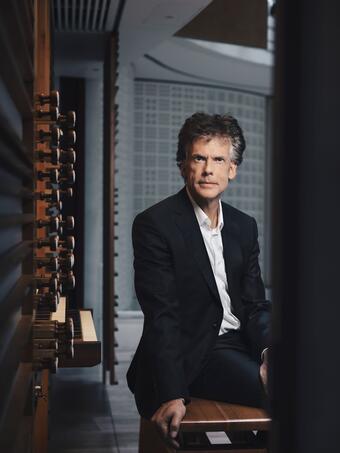
Vice Rector for Art / Univ.-Prof. for Organ / Artistic Director International Summer Academy & International Mozart Competition
+++ Registration for the entrance examination for performance programmes (BA, MA, PGL) and stage design still possible until 28th February 2026 - all further information on the course pages! +++

This degree programme includes exposure to diverse repertoire for the organ from the Renaissance to the present day, historical performance practice and improvisation, performance opportunities at Salzburg Cathedral and other venues, and offers an inspiring atmosphere for artistic development.
Department of Studies & Examinations
+43 676 88122 492
studienabteilung@moz.ac.at
Length
8 semesters / 240 ECTS-AP
Language
German
Application period
01.02.–28.02.2026
Auditions
summer semester each year
dates see at "Audition dates"
overview of all dates
Downloads
This degree course is oriented around current developments and performance practice in the arts, as well as the latest, most up-to-date research in the academic disciplines involved. The goal of the BA in Performance is the practice-oriented and academically sound professional preparation for the following fields:
The goals of the BA in Performance at the Mozarteum University are artistic maturity and independence, critical self-reflection and evaluation, and the artistic and scientific ability to interpret musical works from all periods. The BA in Performance will equip students to pursue their chosen profession and to fulfil artistic, pedagogical and organisational tasks within cultural life.
The curriculum is competence-oriented. After completing the Bachelor's programme, students should:
The eight-semester bachelor's degree programme is modular in structure. Each module comprises teaching and learning content that has been combined to form thematically and didactically meaningful units of study. The names and content descriptions (study objectives) of the individual modules, the number of ECTS credits to be achieved for each module, and the type of performance assessment are specified in the curriculum. The module descriptions refer to the corresponding learning outcomes and competencies. The Bachelor's programme is a face-to-face programme and cannot be offered - not even in part - as a distance learning programme. The courses from the Principal Study, as well as in other One-to-One Tuition, are designed to build upon each other. Prerequisite for enrolment in courses from the Principal Study or One-to-One Tutition is a positive evaluation of the previous semester (from the second semester onwards).
The curriculum provides an overview of the courses to be completed, which are grouped into modules.
The courses are visible online in Curriculum Support:
A prerequisite for beginning a bachelor's degree (BA) is passing an audition. Auditions take place once a year and consist of various partial exams. All information about the audition can be found under “Information about the admissions procedure” further down the page.
A high school diploma is not necessary.
PLEASE NOTE: You can only apply for study programmes for which you have not yet obtained a degree!
Students of the Bachelor's programme are encouraged to complete a semester abroad. Semesters 5 and 6 of the degree programme are particularly suitable for this. In addition to subject-specific competences, a study period abroad can also lead to the acquisition and deepening of:
Examinations and assessments taken during studies abroad can be approved by the Director of Studies as equivalents to compulsory subjects, elective sujects or free elective subjects required by the Mozarteum University for your degree course. The documents required for the approval procedure are to be submitted by the applicant immediately after their exchange semester.
Details at International Affairs.
A prerequisite for admission to the Bachelor's degree programme (BA) is passing an audition, for which applicants must register online via Muvac.
PLEASE NOTE: Applicants can only apply for degree programmes for which they have not yet obtained a degree!
Applicants are then invited to an on-site audition, which consists of several partial examinations.
The programme presented must include pieces typical of the organ repertoire from several styles or periods, taking into account technical and stylistic diversity. The following must be prepared:
Examination in basic knowledge of general music theory (written and oral), including an aural test.
Requirements in the written part of the examination (approx. 60 minutes):
Requirements in the oral part of the examination (5-10 minutes):
Preparation aids:
Audition lasting approx. 10 minutes. The following works must be prepared:
All applicants whose first language is not German must prove their German skills by the time of enrolment at the latest.
Please begin your preparation well in advance and be prepared for the possibility that you may not pass individual parts of the exam on your first attempt! Enrolment is only possible with a complete pass rate for the exam (speaking, writing, reading, listening)! It would be a pity if you were unable to begin your studies due to missing or incomplete proof of German language proficiency.
Application period: 01.02.2026 - 28.02.2026
Exam A - Instrumental audition to determine artistic aptitude: 02.06.2026
Exam B - Music theory & aural skills: 03.06.2026
Exam C - Elementary piano: 03.06.2026
Exam D - German language skills: certificate (to be presented upon enrolment)
Please note that the Mozarteum University Salzburg offers various support options at the time of your audition and during your studies if you have a disability or a chronic illness.
If this applies to you and you would like to take advantage of counselling, please contact Claudia Haitzmann: claudia.haitzmann@moz.ac.at or +43 676 88122 337.
You can find more information about starting your studies here: